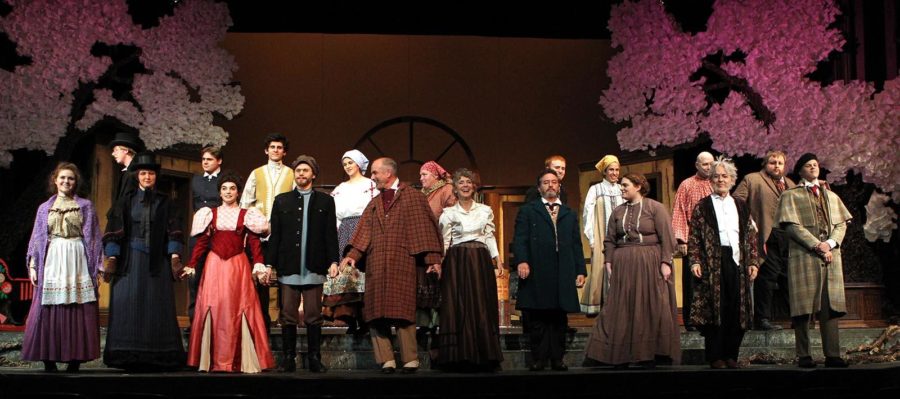Laughing at the rich while they lose everything can be enjoyable. Watching former servants rejoice over buying their former master’s estate is priceless. The Burbank Theater at SRJC has been transformed into a Russian cherry orchard to present Anton Chekhov’s 1904 play, “The Cherry Orchard,” which opened March 7 to a full house.
The cast revolved around the stage in various stages of human pathos. As tragic as the story is, Chekhov intended it to be amusing. He was said to have become very upset when his story was interpreted solely as a tragedy, even angrily rebuking his partner Konstantin Stanislavski for failing to bring that humor to the stage.
Director Leslie McCauley had no trouble making the audience laugh out loud at the foibles of human experience as they played out tragically in this story of the loss of dignity and property.
The ensemble, squeezed like the cherries growing in the orchard, is stuck between longing for the past and hopefulness for the future. The orchard serves not only as a backdrop to the unfolding crisis, but as a central character. The orchard has as much to gain or lose as any human as Russia determines its new direction after an era of feudal serfdom.
Reba Crawford-Hayes is exceptional as Varya, the heartsick and overworked daughter of Lyubov Andreyevna Ranevskaya. Crawford-Hayes’ performance as the only voice of reason was a central thread that ran throughout the play. Her role is as tragic as the rest of the cast. Varya even remarks that she would gladly join a convent in order to escape the pressing demands of managing the huge estate in an era between the greatness of Russia’s past and the greatness of Russia’s future.
Molly Umholtz gives a moving performance as the fallen aristocrat Ranevskaya, who, despite being on the brink of foreclosure and financial ruin, continues to spend money as if it still grew on trees. The fact that the enormous orchard no longer produces income for Ranevskaya is Chekhov’s commentary on how far the rulers of old have fallen without their serfs.
Grace Kent plays Anya, Ranevskaya’s other daughter and the jewel of the family. Kent was sweet and stern in her portrayal of Anya, the troubled child of opulence. Anya must learn to live with considerably less means than her ancestors.
Craig Mason performed brilliantly as Firs, a loveable and bumbling former serf who refused his freedom when it came to him some five decades prior. Firs called the freeing of the serfs a “catastrophe” and chose to stay and serve his old masters rather than embrace his freedom.
Devin Winter plays Petya Trofimov and his performance was well executed and professional. Trofimov is a philosopher, tutor and perpetual student. Petya represents the intellectual class in the new Russia who yearn for a more equal society.
Bill Davis’ character, Yermolai Lopakhin, has benefitted from the turmoil, rising from servanthood to become a wealthy man. Lopakhin seems to have the only plan to save Ranevskaya from ruin, but his plans will only work if he can convince her to embrace them. Davis is clever and convincing as Lopakhin and his frustration at his futile attempts to save his former master add to the humor.
Jessica McAllister plays Charlotta, a young woman who neither embraces the future nor reminisces about the past. Charlotta is a woman with no tangible connections to either. She confesses that she is not even sure if her circus-performer parents were married. McAllister’s acrobatic performance gives a physical charge to the set.
Ron Smith plays Ravnevskaya’s brother, Leonid Andreyevich Gayev. Smith gives a serious performance as an aristocrat with an absent mind. Everyone but Leonid seems to get how unintelligent he seems.
Dana Hunt plays Boris Simeonov-Pishchik, a neighbor that seems to constantly need a loan. Boris has no reservations about asking his nearly broke neighbors to lend him money.
Don’t let the difficult-to-pronounce names deter you from the SRJC adaptation of this masterpiece by Chekhov. Both bright and depressing, funny and serious, with performances and design that transport you from modern Sonoma County to pre-revolutionary Russia, “The Cherry Orchard” is a delight that is sure to please. Performances are at 2 p.m. March 9 and 16, and 8 p.m. March 13-15. Tickets are available at the Burbank Auditorium box office.




